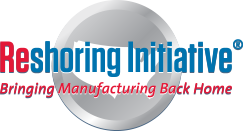Manufacturing Workforce: Training The Next Generation (part 2)
by Harry Moser, Founder/President, Reshoring Initiative® - Originally published by Assembly Magazine, Aug 8, 2022
Part 1 of this series described the magnitude of the skilled workforce problem and some efforts by industry and associations to overcome the problem. Part 2 describes what the government is now, doing and one simple, no cost, government action that needs to be implemented immediately.
Workforce Initiatives:The U.S. Department of Energy (DOE), the U.S. Department of Labor and the AFL-CIO recently announced the launch of a national workforce development strategy for lithium-battery manufacturing. The $5 million investment will support up to five pilot training programs in energy and automotive communities to train battery manufacturing workers in an effort to bolster the domestic battery supply chain.
Communities:
The Florida Job Growth Grant Fund awarded $3.7 million in funding to help develop a talent pipeline in Central Florida. The grant will help Valencia College develop a new program that will train students in utilizing robotics technology for semiconductor manufacturing.Training initiatives:
The National Tooling & Machining Association (NTMA) is a US-based membership trade association, committed to strengthening and helping to ensure the future of manufacturing. NTMA is working to help fill the manufacturing skills gap through a suite of programs targeted at students and their families, schools, the current workforce and support organizations.
The Society of Manufacturing Engineers (SME) is a nonprofit association of professionals, educators and students committed to promoting and supporting the manufacturing industry. Through Tooling U-SME, webinars, the SME Education Foundation, the SME PRIME schools initiative and more, SME creates opportunities to help advance today’s workforce and develop the next generation of manufacturing professionals.U.S. Government: Stop Being part of the Problem
Around 2012 the U.S. Department of Labor called me down to DC to advise them on how to get the national workforce ready for the surge in jobs due to reshoring. In the Labor Secretary’s conference room, I called for the Department to stop being part of the problem and become part of the solution. I projected a slide like Figure 1, headed “Education Pays.”

I asked them if the Department is responsible for the U.S. having a competitive workforce and for our apprenticeship programs. They replied “Yes.” I then said, why does the chart not show the income of those who have passed an apprenticeship, including those who have gone on to manage or own companies. They immediately admitted they should do so and changed the chart text to mention that training and apprenticeships are valid alternatives to degrees.
Despite that small partial victory for U.S. manufacturing and the U.S. workforce, there are still many figures on the Education and Labor websites extolling the unique value of degrees. The figures often have headings such as “Bachelor’s degree yields $1 million more lifetime income than a highschool degree.” I have offered to find all such federal web pages so they can be revised to include data on viable alternatives such as apprenticeships and credentials. I repeat that offer today!
The current incomplete data is quoted by journalists, economists, politicians, universities, parents and guidance counselors. The industry’s efforts to promote apprenticeships and credentials are swamped by the continuing government promotion of degrees. A good measure of the impact is that in the U.S., only about 5% of youths enter an apprenticeship vs. about 60% in Germany and Switzerland.The key difference is a trained workforce
Germany has a large trade surplus while the U.S. has a large trade deficit. Our wage rates are almost identical. The key difference is the trained workforce. Our lack of recruitment and training undercuts our competitiveness, driving the trade deficit and slowing reshoring. I encourage states and trade associations to customize and distribute charts such as Figure 1 to include the income benefits of training. We would be pleased to help.
Supporting skilled workforce development
We cannot control the actions of offshore competitor nations. We have unlimited control over our domestic competitiveness initiatives, such as my call for government action. Let’s collaborate to support skilled workforce development and rebuild the U.S. manufacturing base. For help doing so, contact me at Mobile 847 867 1144. Email: harry.moser@reshorenow.org###

